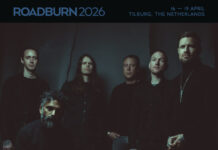Hi there! First of all, thank you for taking the time to do this interview. You’re releasing “Shehili” on 3 May. How are you feeling about the release?
All the pleasure is mine. The album release, what can I say, I’m excited and confident. The whole MYRATH family, actually. We’re just waiting for the release date. It’s been two years now since we released anything. We worked very very hard on the “Shehili” album, so that’s why we are excited and confident. At the same time we’re a little bit, I wouldn’t say afraid, but maybe anxious about the release, and the reaction of the fans to the new sound. How are they going to receive the new genre, which is blazing desert metal, and how are they going to accept and receive the music? Will they understand it? Will they accept it as a new genre on the market? On a personal level, I think I’m very very very satisfied with the result of the album, some songs I like the most, and some songs I like a bit less, but in general, I think it’s pretty fresh music.
I agree, it does sound fresh! “Shehili” is your fifth studio album. How do you think it differs from the rest of the albums you put out?
Actually, the writing process was not that different, we used to always use the same process in writing music, you know, but musically it’s different because it’s more simple than the other albums. When I say simple, I mean it’s less progressive than the other albums because we were actually trying to find our style, our personal style. We already tried to put our own identity into our music in the previous albums, but we didn’t really found our style yet, so with this album we created a new genre: blazing desert metal. “Shehili” is different in a way that it’s more commercial. When I say commercial there are two kinds of commercial, good commercial and bad commercial. You can make something commercial, but still have quality in there. It’s like food. For example, there’s McDonalds, and then you have Five Guys. But other commercial, but one of them has a soul, and the other one has nothing. I always compare music to food (laughs). There are also differences in the chant and vocal lines, they are more mature. The spirit of the songs are more elaborated, and more mature. The production is also way different from whole albums united. This time, the album was produced by three producers, but there is one soul. The main producer and also co-songwriter is Kevin Codfert. He wrote, for example, “Stardust, where he is also playing the piano. There’s also a song where he made the solo, he also does keyboards, he wrote many ideas. We also collaborated with Jens Bogren, and the third producer is Eike Freese from Chameleon Studio in Germany. There were three producers on the album, and the production is massive. It has a massive sound. We used to record the drums in a very basic way, you know, in a basic fashion, in just a normal studio. But thanks to Max, the boss of earMUSIC, who gave us the opportunity to re-record the drums, where Morgan flew to Hamburg to re-record them in a proper way in a very professional studio in Hamburg. The sound is amazing, so comparing the production to the other records… It’s way better, and it’s way more professional.
You mentioned the massive sound, which I totally agree with, but in a way, I think the album still sounds very organic. Is that something you wanted?
Exactly, it does! Actually, we didn’t make to create something too complicated, we didn’t want to complicate things, and we didn’t want to calculate things. So, it came to be like this spontaneously, I don’t know how it came. We always try to follow our heart and our instinct. So yes, we never calculate anything, it came like this because it did, because it came from the heart, because it was honest. That’s why. Even when it comes down to the music, when we wrote the music, we never calculated anything. So, we always try to keep the best of our ideas, even for the sound. We try to always make it sound better. Like I mentioned before for the drums, now it sounds more organic, more natural and big. “Shehili” also has a very bombastic sound, with a bombastic sound, with a big sound, you can feel the organic nature of the album. Like I said, it’s thanks to Max, who gave us the opportunity to rent the studio and to record the drums in a very professional way with professional guys, top (drum) microphones, so in the end I think it’s karma. (laughs) Good karma.
You mentioned that the songwriting has stayed the same. How do you guys come about the songs?
This time around everyone had their own ideas, their own philosophies and their own way of writing. Everyone collected their own ideas. Then Kevin Codfert called us that he would check whatever we did in two months in Tunisia, we’d meet in a hotel room together, he’d bring his soundcard and laptop. Everyone had to bring their laptop and instruments so we could record our ideas on our laptops. We gathered in a small room in a hotel near to my home city Sousse, which is a good place because it’s very beautiful. It’s on the beach, and it’s very touristic. There’s all the elements to be comfortable, to be mindfree, no stress, no traffic, nothing. We stayed two weeks in the room, gathering all the ideas. We kept the good ones, and we threw out the bad ones. If we would get some fifty-fifty ideas, we’d keep them and try to include them. If they would work, we kept them, if they didn’t, we put them to the trash. That’s the first step in the process, gathering and collecting all the ideas together. We try to improve them, and from one idea we get another one and so on. Then, Kevin Codfert took a flight to Paris, gathering everything and began making arrangements for the songs. Then, we get back to Tunis to record with the National Tunisian Orchestra, you know all the Tunisian elements and the sceneries in the sound, the arrangements. After we finished with the National Orchestra, we got back to France to go to Sweden to meet the producer Jens Bogren to complete the mixing and premastering, which he finished in Sweden. We had a listening session with the guys of earMUSIC in Edel`s office. They heard the album, and Max, the boss of earMUSIC was in love with it. He said that he had goosebumps, which he hadn’t had in 10 years while listening to a metal or rock album, which was very flattering to us. We were shocked. He said that there is only one thing that he didn’t like, which was the sound of the drums. The playing was amazing, everything was good, except the sound of the drums. They sounded too sophisticated, we could do better. We recorded it in a very basic way and we edit them from a trigger. We put some triggers to make it sound way more professional. We agreed to get rid of the triggers, and we recorded in a very professional way in the best sounding studio in Hamburg with Chameleon Studio. The third songwriter, and producer Eike Freese managed the studio. They re-recorded the drums there. That’s why I say that there are three different producers involved. For Eike Freese it was okay to only re-record the drums. But he fell in love with the record. With the assistance of Kevin Codfert, they checked every song, while recording the drums, they treated each song, and they treated the volumes and the sound of the guitars and everything, even though Jens Bogren had already done that in Sweden. His job only was to mix and premaster, and he spent also too much time in the studio treating the instruments and all. So you’ve got three different producers, three different sounds, but in the end, only one vision. That’s why every song on this record has its own voice.
The album is called “Shehili”. What does that mean?
Shehili is a sirocco, a very ancient wind. The natives used to call sirocco shehili, you know, even now it’s called shehili, but it’s a very ancient word. Shehili means the hot blazing wind coming from the South.
Are the lyrics of the album connected to that? Or what kinds of stories are present on “Shehili”?
The lyrics are written by two friends of ours. The first one is, Aymen Jaouadi, our friend since we were young. We used to write lyrics together. He took the task of writing the lyrics upon him, because when we were young he was the first one who said that he had some songs he wrote. We don’t really consider Myrath as a band, we consider it as a family. So, he wrote the majority of the lyrics. Perinne Perez Fuentes, the wife of our producer Kevin Codfert was also involved in the process of writing the lyrics. So, these are the two people who wrote the lyrics, with my assistance, of course. They wrote the totality of the songs. I was only there to give my opinion and to change some wordings and change some sentences that i didn’t like or which could be better. About the storyline, it’s not a concept album, every song has its own story. For example “Dance” is about a Syrian ballet dancer, who received death threats from ISIS, but chose to keep dancing. Instead, he continues his dream. He has a tattoo in his neck that says “Dance Or Die”. We originally wanted to name the song like that, but we lost the “Die”, we kept only “Dance”. For the Syrian dancer, it’s a very personal subject, but it’s more than about the dancer. In general, it talks about every one of us in this world. When I say: “Dance with me, dance”, you know… It’s a dance of life, a dance of death, a dance for each own life, a dance for freedom, a dance for achievement, a dance against the stream, a dance against the evil, a dance against the darkness and a dance for the joy of life. This is what we wanted to do, and what we wanted to achieve by giving it another aspect. When you listen to metal, people always refer to it as associated with death, blood, suicide and sacrifice. I think it’s time to change that image a little bit, even though we are metalheads, and we like it, we can write music that even my grandmother can listen to, for example. (laughs)
Talking about the metal scene. Especially in Europe, the metal scene is focused on mostly European bands, and bands from the US, which is very unfortunate. What sort of metal bands does North Africa have?
In Tunisia, we have a band called Carthagods. They are releasing a new album very soon, and they just released a song which is called “The Monster In Me”. They are playing classic heavy metal, and they’re very very very good. The way they play, the way they sound, is fantastic. They’re an old band, we started together actually. I like the way that they also sacrificed many many things in order to reach their goals. Another band that I really like is Barzakh. We also have a band called Nawather. They’re influenced by us, they try to do the same thing, with metal, but in their own way of course, which I really like. What else? I think in Morocco they also have a lot of good bands, such as Kawn, and in Algeria they have some as well, but I don’t know, they are not that famous or anything. They have a metal scene though, a very good metal scene. Yes, it’s unfortunate that the European metal scene is so focused on Europe and US metal. Because in every content there are a lot of great bands, whether it’s the African continent, or South America, or Asia. There are many good bands! Unfortunately, they don’t always have the means to reach the top elite of the European metal scene. That’s very sad, but luckily in every continent you have some exceptions, like us for example. There are many Myraths in other continents. (laughs)
Thanks for all the suggestions! Now, what are your plans for after the release of “Shehili”. I know that you guys are playing at Wacken and Sweden Rock in summer. Are there any more shows coming along?
We are playing at Sweden Rock Festival and Wacken Open Air. For the rest of the summer, we don’t have anything planned. In September, we will have a mini tour in Japan, and we still need to reveal a European tour in November. It’s going to be a one month European tour, with another band. We won’t be the support act, but we’ll be there as a special guest.
What can people except from those shows?
Actually, in Wacken and Sweden Rock we will make a big show, full of surprises, like magic for example. We’ll use magic, we’ll sing songs from the new album, songs from the previous albums – I think one from each album. There will be a big light show, pyrotechnics, fire, and a magic illusion show.
I’m assuming here, that those things won’t be possible to take with you during the European tour? (laughs)
Yeah, of course. (laughs) They will be much smaller. We will do this exceptionally for Wacken and Sweden Rock. So, in November I think there will be less magic (laughs), because every day won’t be possible because of the logistics. Less magic, more us. Maybe if we would do our own headlining tour, we could do it. But for the moment, with this tour, we will only play the music. (laughs)
Awesome! Let’s hope that we’ll be able to catch one of those shows! Do you have any last thoughts for our readers?
Actually, we’ve never been in Finland before. I think we were only once in Scandinavia, and it was in Copenhagen. But I know at least that in Finland, people are openminded for Myrath in the metal scene. So, I can’t wait to come to Finland and play there as a headliner, not just as a special guest. Believe me, we will bring the sun of Tunisia, and the warmth of the Sahara wind to the stage for the fans!






[…] do quinteto tunisiano de metal oriental progressivo Myrath, definiu o quinto lançamento deles em entrevista à revista finnalndesa Tuonela. Para ele, a banda mudou seu gênero com este registro de 2019 e assumidamente optou por um caminho […]